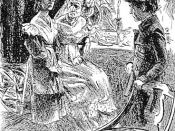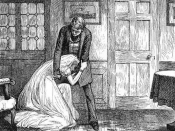Charles Dickens was a Victorian author who penned numerous novels, and has been widely celebrated for his work. It does not come as a surprise that his personal life was extremely interesting, and had a lasting impact on his novels. One thing that became apparent in his books was his treatment of gender, and how it affected the characters and their behaviors. Certain qualities were only imposed upon the women and others were only on the men, creating a basis for how all the characters must act. In particular, the women of Great Expectations were shown with interesting qualities, from which they had to act on. However, one does question why Dickens chose to represent women with the characteristics that he did, and what made him to do so. The female characters in Great Expectations are generally portrayed in a negative manner throughout the novel due to DickensÃÂs own personal experiences with women.
It is a known fact that men and women have different roles and behavior in society and this was especially true during the Victorian era. However, in Great Expectations the roles are switched with women opposed to the Victorian ideals of divine feminity and womanhood, and the men taking effeminate characteristics as the novel progresses (Van Brunt). With no consideration of the class level (Farrell), Dickens creates a display of scheming and hardy women who have no ability to sympathize (Rose). Pip is easily influenced by these gender roles and struggles with the two extremes of ÃÂmasculine strength and feminine vulnerabilityÃÂ while being around the women of Great Expectations (Van Brunt). When Pip was growing up, Mrs. Joe followed DickensÃÂs standards of womanhood, which leads Pip to seek nurturing from Joe (Farrell). Instead of fulfilling his own health and comfort, Joe takes upon the role of a...


![[Mary, Queen of Scots] (LOC)](https://s.writework.com/uploads/9/91750/mary-queen-scots-loc-thumb.jpg)